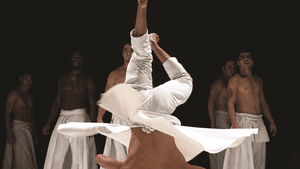Stay in the Loop
BSR publishes on a weekly schedule, with an email newsletter every Wednesday and Thursday morning. There’s no paywall, and subscribing is always free.
Modern-day Dervishes
NextMove Dance presents Compagnie Hervé Koubi's 'What the Day Owes to the Night' (first review)

In Yasmina Khadra’s novel, What the Day Owes to the Night, an impoverished Algerian farm boy is raised in his well-to-do uncle’s home in a more Europeanized town. French choreographer Hervé Koubi has said that, in discovering his roots in Algeria, he felt a kinship with that story. The 75-minute dance of the same name, produced by NextMove Dance, reflects the choreographer’s journey of self-discovery in an Algeria of Arabic tradition and French colonialism, told in the languages of traditional and contemporary dance and the streets.
Sufi music, the work of modern composer Maxime Bodson, Kronos Quartet’s work with musician and composer Hamza El Din, and the work of J.S. Bach all set the mood for Koubi’s postcolonial vision. Costumes by Guillaume Gabriel also combined contemporary and traditional influences, with long white pants over which white skirts flared out in the dancers’ vertiginous spins that called to mind the mystical practice of the whirling Dervishes, finding God through dance. Costumes can always add to a dance, but these were full partners in the dramatic effect.
Koubi explained to the audience that the 12 men in the piece were street dancers from Algeria, Morocco, Burkina Faso, and France. Their dance origins were most evident in the precision and skill with which they performed street moves, characterized by handstands in which the feet perform their steps overhead. One spectacular handstand move, in which the dancer whirled in repeated spins with both hands crossed on the stage, beautifully defied the logic of physics and anatomy.
Freedom and miasma
Within a framework that included traditional and contemporary ensemble movement, Koubi allowed for some freedom in the choice of moves. The dancers flew about the stage in handsprings, cartwheels, backflips, and front flips, sometimes performed off the backs of other dancers. Whirling spins, on one hand or two or on the dancers’ heads, sent their skirts flying in circles.
The piece felt as if it could be at home both in the souk of a past age and in the streets of modern Algeria. Combining mysticism, challenge, and yearning, it reached its peak when a dancer rose on the backs of his fellows, only to fall again as the tower crashed gently beneath him: not once but at several points during the performance. The heart seeks, it seemed to say, but can never truly find, or figure out, what it is looking for. At the end of the piece, a dancer recited a poem by Koubi in Arabic that expressed this longing and its answer: he found in the troupe of dancers the lost brothers of his heart. It raised the hairs on the back of my neck.
At 75 minutes, the piece was a bit long, but there is no question What the Day Owes to the Night offers a stunning evening of dance. My only critique is with the production’s pervasive mist. A miasma of fumes confronted viewers at the show’s entrance and I immediately began to cough. The mist did not lift but curled through the theater as if we sat in a swamp.
I could see no artistic benefit from the mist and was further dismayed to learn that a number of upcoming companies will also be using this atmospheric trick. Here is the thing: if you have to inform your audience the house is not, in fact, on fire, you have a problem. Technically the mist is not toxic, or so we were assured, but it affected my breathing and the breathing of those around me.
To read Merilyn Jackson's review, click here.
What, When, Where
Ce que le jour doit a la nuit (What the Day Owes to the Night). Choreographed by Hervé Koubi, Compagnie Hervé Koubi. NextMoveDance. October 12-15, 2017, at the Prince Theater, 1412 Chestnut Street, Philadelphia. (215) 422-4580 or nextmovedance.org.
Sign up for our newsletter
All of the week's new articles, all in one place. Sign up for the free weekly BSR newsletters, and don't miss a conversation.

 Camille Bacon-Smith
Camille Bacon-Smith